Music Reviews
AN EVENING WITH AFRICA'S LADY OF SONG - Margaret Ferguson accompanied by Jonathan Ellis

It was good to find Margaret Ferguson back on the Fringe again accompanied by the ubiquitous Jonathan Ellis. Margaret has a very fine voice which explains why she has so often been nominated for a Fringe award. And she has the ability to sing just about anything. So we had a programme starting with Mozart, with amazing bel canto, and Schubert and then moving on to operatic arias, English songs by Finzi and Michael Head and concluding with Sondheim, Gershwin, and Flanders and Swann. Along the way Margaret gave us a lively Spanish song with her own castanet accompaniment, an unaccompanied African song reflecting her birthplace, Ghana,. and two Polish songs reminding us that she had studied at the Mozart Academy in Poland.
Margaret has the most amazing breath control: she seems able to sing even the most demanding works without any effort at all. In addition she is her own compere introducing her programme with attractive charm and wit and making the large audience feel really welcome to her concert. Jonathan Ellis is a wonderfully sensitive accompanist for her.
Peter Low
BURBAGE BAND ANNIVERSARY CONCERT - Burbage Band
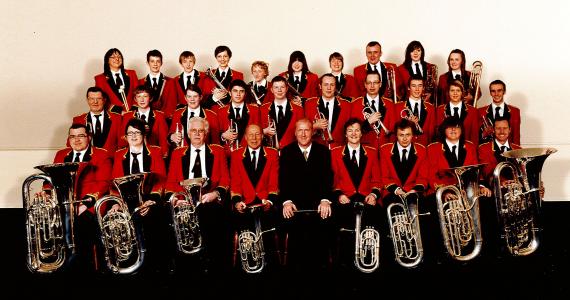
Buxton is lucky to have two accomplished brass bands. The rivalry between the Fairfield and Burbage bands is friendly and respectful. Today, though, all the attention was rightly focussed on the band in red from Burbage.
The Crescent makes a perfect amphitheatre and the sound of the band was captured clearly and projected from the temporary stage. This may have given a sharpness and edge to the sound that can sometimes be lost on the open spaces of the traditional village green outdoor performance.
Despite the poor weather - and there is no point harping on about that this year - a healthy and loyal crowd huddled together in waterproofs and under umbrellas to be richly entertained by the Band and the Junior Section.
The programme was varied but the Band showed command and confidence in elegiac mood as well as in more military pieces or the virtuoso firecrackers. The mood and tempo were carefully, yet firmly, directed by Steve Critchlow, under whose leadership the Band has flourished in recent years.
The concert was held to mark the 150th anniversary of Burbage Band. Most of the musicians are homegrown and are taught by senior Band members. This ensures continuity and is rightly a matter of pride for all associated with it. We can be confident that the Burbage Band has the physical resources to entertain us for many years to come
For more information about the Band's history, engagements, how you might support it and recordings go to:
http://www.burbageband.co.uk/
The Band can be heard on the Pavilion Gardens bandstand on 4th September starting at 2pm. They, and Buxton, are due for a proper summer's day.
Keith Savage
CAN'T BE FOLKED - Perry Huntsman and Hilary Felstead
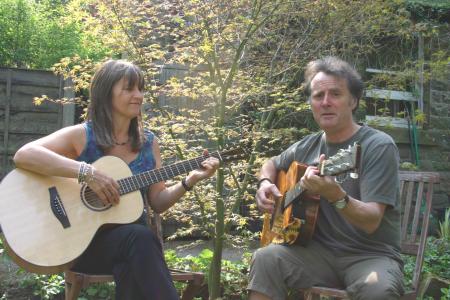
Underground Venues 9th and 11th July
Can't be Folked are Perry and Hilary, a duo of skilled singer guitarists. They played to a packed venue and work really well together. Perry, who plays an interesting and varied range of songs, has been described by none other than John Renbourn as "that bloke from Buxton". I liked his finger-picking guitar style. She has an interesting voice with a smoky quality.
We were treated to a varied programme which ranged from blues and a John Martin cover. They included a number 'Take it Easy' written by Hilary. The highlight of the set was 'She Moves through the Fair' - the tradition folk song sung acapella by Hilary. I enjoyed the bluesy number 'Bad news'.
They finished on a high note with 'Morphine' and then moved for the encore to 'Fairytale Lullaby' by John Martin a change of mood which was very effective.
They did cram in a lot of songs - there was a surprising lack of patter for a folk gig.
Do catch them on Monday - you won't regret it.
Mike Rose
CHAMBER MUSIC FOR BASSET CLARINET AND STRINGS - Liz Jordan with the Deconet String Quartet
The Deconet Quartet are now regular Fringe performers and this year they brought with them Elizabeth Jordan and her basset clarinet made for her by her fiancé as a surprise wedding present. They gave us Mozart's well known clarinet quintet K581. Although usually played by a conventional clarinet it was in fact written for the basset clarinet so it was for many of the audience the first time they had heard it as Mozart intended. It is, of course, beautiful music and Elizabeth absolutely entranced us.
The second part of Deconet's programme was rather more serious and consisted of Dvorak's Quartet no 13 opus 106. Composed largely after Dvorak had returned to Europe from the United States and was still mourning for his recently deceased first love, it still shows the composer's Bohemian origin, a quality that was to remain with him all his life. It is a demanding work and it says much about Deconet's abilities that the could perform it with such confidence. Not many in the audience had actually ever heard it, live, before but this performance will not quickly be forgotten for its enthusiastic and vigorous ensemble.
Peter Low
CHAMBER MUSIC FOR OBOE AND STRINGS - Bright String Trio Plus
United Reformed Church, 12th July
The members of the Bright String Trio are regular performers at the Fringe - and will be heard again as part of the Deconet Quartet on 24th July. Additionally they will contribute to the High Peak Orchestra and the Amaretti Chamber Orchestra. Their energy and passion for sharing music is astonishing.
Tonight's imaginative and varied programme gave much pleasure and was loudly applauded by a good audience at what is one of the best venues on the Fringe.
The first half of the programme was made up of music from the 20th century. Guest oboist Simon Beesley began with the first three pieces from Britten's Metamorphoses after Ovid. These brief pieces have a sketchy, improvisational quality that is well-suited to the sound of the oboe. Composed in 1951 Pan, Niobe and Phaeton are very different ways of representing stories musically. Simon's oboe filled the Church beautifully.
The Trio then gave us the Andante from Martinu's String Trio No 1. Although written in 1923 the piece was not finally published until 2006. Cellist Mary Dainton said that they might play the whole piece next year - this year we had to accept this appetiser. Some of Martinu's music is more determinedly difficult and this Andante only gradually found a resolution. We must be patient and wait to hear the whole.
To conclude the first half all four musicians joined forces to play Gordon Jacobs' Quartet for Oboe and Strings. Jacobs survived the First World War and went on to enjoy a long life. A prolific composer, some of his work for brass bands figures in local programmes. This Quartet was premiered in 1938. The relatively simple themes and motifs develop in a series of dance-like movements. The pleasure in hearing this music more than justified its choice.
For the second half we were treated to Beethoven's early String Trio No 1. There is no place to hide in such a piece and at times Nicola Bright (violin), Mary Anderson (viola) and Mary Dainton (cello) led the way as different combinations of voice emerged. The brighter tempi seemed to suit the Trio best and if there were some moments of uncertainty the abiding impression was one of musicians delighting in being able to share the work of a great composer with appreciative friends and admirers.
Many thanks to Nicola, Mary and Mary. We look forward to your return to the Fringe.
Keith Savage
CHORUS NATUS EST - Performing Arts Etc
Chorus natus Est is a group of talented young singers brought together by Buxton Fringe regular and award winner Sam Dunkley. All nine, five men and three women, are graduates of leading British music universities who together describe themselves as a 'chamber choir performing intimate concerts across the country'. They presented a very mixed repertoire for their first visit to Buxton that started with a medley of five Beatles songs, followed by a Hebrew love song, a couple of Broadway numbers, an opera aria, and a few classics including Moon River and Somewhere Over the Rainbow. The full hour also included two spirituals and Bohemian Rhapsody (Queen). The varied repertoire was delivered with good humour and youthful vigour accompanied by what Sam accurately described as 'a slightly dubious electric piano' which was slightly too loud for the tiny Paupers Pit. This is an opportunity to hear well trained young music performers at an early stage in their careers. Well worth the £9 ticket price if you have an hour available next weekend, Chorus natus Est return to Buxton's Underground Venues with two performances on Saturday 23 at 1:45 and 6:15pm, and a final chance to enjoy these young singers harmonies on Sunday 24 at 6:15pm.
Jean Ball
CLASSICAL GUITAR MUSIC FOR A SUMMER EVENING - Edward Billingham
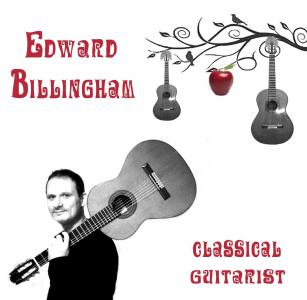
An audience of around 60 were fortunate to have the pleasure of hearing Edward Billingham at the Burbage Institute on Sunday July 17th. Edward Billingham is a virtuoso guitarist, based in the North West of England and is active as a performer and teacher.
The weather was dreadful in Buxton but thankfully Edward brought a great deal of sunshine from Spain in the music of Albeniz and Tarrega, from Italy in the music of Vivaldi and Giuliani and from Brazil in the music of Villa Lobos. His guitar programme was curtailed somewhat because of a bicycle injury a few days before the concert. Edward's cellist friend, Melanie Jones helped him out by playing for quite a while in the second half.
He started the concert with 3 pieces by Villa Lobos and showed his ability to bring out a warm cantabile melody line. This was followed by a transcription of a Vivaldi concerto which sounded as convincing as if written originally for the guitar. The Giuliani Grande Overture which if transcribed for orchestra may have sounded like a Rossini work, brought out a more powerful approach from the performer. The final piece in the first half called Recuerdos de la Alhambra demonstrated his technical ability to play tremolos effectively and at the same time showing sensitivity to the phrasing of the melody line.
The second half began with Melanie Jones' rendition of Bach's Cello Suite number 1 playing four of its movements. Melanie gave a very competent performance of this much loved piece which is often played by guitarists, especially the prelude which I believe is a piece in Edward's repertoire.
The concert ended with 3 transcriptions of piano pieces from Albeniz. Edward's sensitivity to the mood and structure helped to evoke several places in Spain and beyond.
The audience much appreciated the beautiful sounds he brought out of the guitar, his sensitivity to the mood, a feeling for the structure of the pieces and his humour. They appreciated his determination for playing when injured and were grateful to Melanie Jones for playing at short notice.
We hope Edward's bicycle injuries soon get better.
Roger Horvath
DERBYSHIRE CCYO SUMMER CONCERT - Derbyshire City and County Youth Orchestra
Pavilion Gardens - Octagon Hall 7.30 pm
The pick of the young talented orchestral players in Derbyshire and Derby and a legend of a conductor, as Peter Stark is, can only produce an amazing evening of music; and indeed that is exactly what happened. Some slightly unusual programming gave us the concerto first. Brahms Double Concerto for Violin and 'Cello is a tricky work for all concerned not just the soloists, and this acoustic makes it even more of a challenge. The two excellent soloists, Cassandra Hamilton, and Tom Wilkes, both past members of the orchestra, gave a mature and involved rendition of this wonderful work.
For my taste I could have done with more projection of the soloists, but I put this down to the strange acoustics of the Octagon. There really isn't anywhere that the soloists could have been that would have helped their sound. The 1st movement was a true Brahms sound and the horns deserve a special mention for their super playing. The 2nd movement was sensuous and poignant, although the hall didn't really help the icy conclusion - such a brilliant piece of writing.
The last movement swept along with some great support from the basses, and generally the orchestral accompaniment was 'tight' and musical. The ending was a little loud for the soloists but I think I was in a bad part of the hall for hearing. This mighty work was a masterly performance by all concerned, and deserved the extended applause it received.
After the interval we were entertained and amused by Rossini "Barber of Seville" with style and panache. A nice touch was that the soloists had joined the orchestra.
But then what was this? A strange piece in the programme called 'Gear Train' by Damion Harron for 4 percussionists. And what a piece it was! Rhythmically complex, and very immediate, and fun; and controlled so well by the four players who were clearly enjoying the performance as much as the audience and communicated that fact in every bar! Then we had another treat in the form of a quintet of wind players called Perfect 5th consisting of Flute, Oboe, Clarinet, Bassoon and French Horn. They played a 55 second piece with flare, enjoyment and musicality and we could hear why they had been winners in the NFMY Associated Board Chamber Music section - what a pity we didn't get to find out what the piece was!
Malcolm Arnold had the last word of the evening in the guise of his Four Scottish Dances. Yet again the horns were working well, as was every other section in the orchestra. This was a well honed sound and brought out the humour and emotion of the music and the man who wrote it. Congratulations to the players and everyone associated with the orchestra, but above all to Peter Stark who has this wonderful ability to bring out the best in the players and form it into a musical and cohesive whole that just sounded so professional
Andrew J Hodkinson
EARLY MUSIC CONCERT - Partita
13 July 2011
Partita are now firmly established on the Fringe as the early music ensemble. For an authentic experience of the music of the fourteenth to the sixteenth century this is the group to hear. What always comes a surprise is the subdued dynamic of the early instruments such as the lute and theorbo. Did people actually seriously listen to this music or did it just provide an agreeable background to the intrigues of a court?
As well as European music Partita had included in their programme some baroque music from Latin America. This had resulted from Spanish missionaries using music to communicate with the South American natives. Apparently it was received with enthusiasm!
Partita are extremely fortunate in having two marvellous voices, Sasha Johnson Manning (soprano) and Holly Marland (mezzo). Together their duets created some of the loveliest sounds to be heard at this years Fringe. Particularly remarkable was the Gloria by Pachelbel recently discovered in an Oxford library where it had lain forgotten since being deposited there by Pahcelbel's son in 1706. Those of us who only know of Pachelbel through the well known canon were entranced by this beautiful music..
In addition to renaissance and early baroque music Partita had also arranged some Handel arias for early instruments and for two voices. So they gave us How Beautiful are the Feet from Messiah and O Lovely Peace from Judas Maccabeus as a duets both of which were stunningly successful.
Peter Low
Partita will perform another early music concert at 1pm on Wed 20 July at Buxton Methodist Church £5/£4 conc
EARLY MUSIC CONCERTS - Partita
This was a delightful haven of peace and superb music given by Sasha Johnson Manning, Holly Marland, and Roger Child. They launched into the first Thomas Campian song "Tune thy music to thy heart", with serene aplomb. The accompaniment on the Theorbo was a delight which so effectively complemented the vocal line. This was followed by a Theorbo solo, Recercar by Spinacino, and clearly showed what an accomplished musician Roger Child is.
As well as Thomas Campian, and some Italian sad love songs, including the poignant "Let me die" by Claudio Monteverdi, we were treated to a group of Purcell pieces, including one of the gems of the programme "One charming night" which is rich in double meaning and rather 'spicey'. The last piece of Purcell and indeed the last piece of the recital, could for me have been performed at a faster pace, but maybe we might have lost the amazing falling sequences.
I felt that the set of three Dowland songs containing the true gem "In this trembling shadow cast", were very nearly the high point of the programme, but alas I did get the feeling that the 2nd and 3rd songs lacked the high standard of performance they deserved. The first however ("In this trembling shadow cast") contained the most gentle and sad sound I have heard for a long time. Quite stunning in its beauty.
This versatile and musical group are a real pleasure to experience and even if you are not naturally a fan of early music you cannot but be enthralled by the sincerity and affection these performers bring to this music. The translations in the programme for the Italian songs was of great help, but I would have liked the Italian to be there also. Some communication with the audience would have greatly helped our appreciation of these fine musicians and their choice of music.
Andrew J Hodkinson
GO WITH THE FLOW - Local Vocals
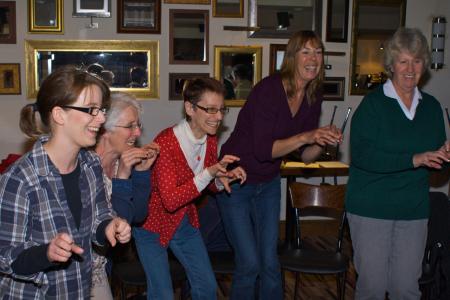
What an enjoyable evening this was! Not strictly a concert, more a 'sharing', this delightful evening at St John's Church showcased the work of Buxton's drop-in community choir, Local Vocals.
Led by Carol Bowns, we (and I say 'we' as the audience were as much a part of the experience as the choir) were taken on a musical journey through folk songs from around the world, old favourites like The Skye Boat Song and gospel spirituals. Carol's unpretentious, inclusive style clearly inspires her choir and her insights into how to get people singing certainly seem to bear fruits. No sheet music, no lyric sheets, just the words up on an overhead projector (good for audience participation, as well as for opening up the vocal chords!), with Carol wearing clogs so that she could stamp out a rhythm.
Local Vocals is not about serious musicianship, it is about singing, pure and simple. It is about regaining the joy of singing that so many lose as they reach the inhibitions of adulthood. There is no doubt that from the smiles on the faces of the choir as well as the audience, that it succeeds.
The evening was also something of a recruitment drive - anyone interested in joining should go to the next session on 5 September - I'm sure you'd enjoy it. Even this hard-bitten reviewer was singing along by the end!
Robbie Carnegie
GREAT THINGS - A CELEBRATION IN SONG OF THE GREAT THINGS IN LIFE - Jonathan Hall (bass-baritone) & Piotr Wisniewski (piano)
Jonathan Hall has a pleasant bass- baritone voice which seems to be particularly well suited to the work of twentieth century English composers which made up the bulk of his short recital. Special mention needs to be made of his performance of three contrasting songs by Peter Warlock and his ability to capture the inherent sadness of Finzi's Dear Lizbie Browne.
Jonathan is fortunate in having Piotr Wisniewski not only to assist his studies but as his accompanist so that the two together gave very confident performances, particularly of Schubert's An die Musik.
Rather unusually there was no admission charge but the audience were invited to give a donation at the end. This is an interesting way for the performers to assess what the audience thought of the recital - quite a lot judging from the contributions!
Peter Low
HARMONY TOUR - Richard Taylor
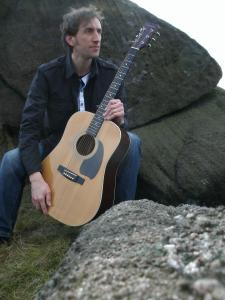
Barrel Room, Underground Venues, 9th July 2011
...and relax...
It had been one of those hectic days, so by the time I slumped into my seat in the comforting darkness of the Barrel Room I was ready to be soothed. And I wasn't disappointed; Richard Taylor is convivial company, a relaxed and confident performer very much at home with his Scottish handmade guitar and atmospheric music.
This is not your standard guitar playing, though classically trained Richard uses the whole of the guitar; alternate tuning, tapping, harmonics, and more technical terms than your reviewer is confident in the spelling of. "How to categorise this music? Not folk, not rock or classical - acoustic & ambient maybe," he challenged. But good music doesn't need a label and this is definitely good music.
Playing his own material, his style is too unconventional for anything else perhaps, although there is a nod to Bach, the standard of composition is consistently high. With pieces such as 'The Warm Summer's Breeze' (written this April in Castleton!) and 'Infinite Realities', it's four ideas combined in a mix of styles and effects characterising the show, I found myself drifting away as the quicksilver playing created a relaxed and intimate mood.
There was plenty of chat as Richard discussed the techniques that he was using and illustrated their effects. There is always a danger that the technique becomes all, virtuosity becomes self-indulgent - think heavy metal guitar solos, for instance. Technique must always serve the music and he stayed comfortably on the right side of that line, this is by no means a show solely for the guitar aficionado, the music is warm and accessible.
However, for the fan of classical or acoustic guitar then this is a gem. A performer happy to talk about his craft, and at the end as one of the audience asked about a particular effect we had an impromptu tutorial for the guitarists in the audience - a lovely moment to close with.
The Harmony Tour continues in the Barrel Room at Underground Venues on 12th July at 7pm, and on 16th and 22nd July at 3:45pm.
Steve Walker
JAKE THACKRAY RIDES AGAIN - Keith E Smith
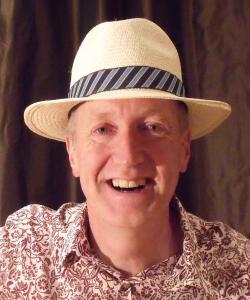
Barrel Rooms, Underground Venues. 16/7/11.
Following his very successful outing last year Keith Smith has added several songs to his repertoire of the underrated Yorkshire troubadour and wordsmith, and the wider the audience reached by the more Thackray songs the better. This highly appreciative audience clearly relished the latter's sometimes rude anti-authoritarianism, accurately rendered by Smith and acoustic guitar, and it even contained one or two genuine Thackray geeks.
Smith takes us rapidly through 15 of Thackray's songs, each one faithfully delivered in the original's deep baritone and clipped Yorkshire vowels. Topics range from the supernatural ('The Castleford Ladies' Magic Circle') to the spiteful neighbours' reaction to a widow sowing her wild oats ('The Hair the Widow of Bridlington'). Thackray's Yorkshire is never far away, as in this last song and 'Country Bus'. The gentle humour and keen observations run through these songs, while songs such as 'It was only a Gypsy', 'The Lodger' and the much-loved 'Bantam Cock', are a little more bawdy in tone. My own favourites are nostalgic time-pieces such as 'Personal Column' and social satires like 'La-Di-Dah', although this song has a tenderness to it at the same time. 'Leopold Alcox' is about the distant relation we all have but won't own up to, while I love the image of Thackray taking home his 'bird for some Turkish moussaka' to his house with cut glass and porcelain, antirrinhums and wisteria, Chippendales and Picassos.
The one cover is the satirical and tear (of pain)-inducing 'Brother Gorilla', Thackray's translation of a song by French singer Georges Brassens. It is fitting that the little-known (in this country) Brassens gets credit for the huge influence he had on the Yorkshireman. It can be heard not only on this cover song but in the guitar playing, lyrics and anti-establishment sentiment of many of these songs.
Smith's press release stresses that he does not try to mimic the great man too much, but this is a very convincing tribute. The vocal and guitar style encapsulate the spirit of Thackray and Smith plainly has a deep affection and respect for his subject. There are one or two fluffed words on the 'new' songs, but this is their first outing and as Smith says, there are an awful lot of words in these songs.
We are promised different set lists for the various shows, as there are too many songs to fit into an hour. It is an hour spent very well indeed and will be re-created this evening and on the 19th and 23rd. If you want good music and laughs and are not too easily shocked, I strongly recommend that you see one of these shows.
Ian Hamilton
LAST NIGHT OF THE FRINGE! - Nicholas Bennett and Christopher Ellis
This was a return to the fringe by the duo of young performers, Nicholas Bennett - baritone and Christopher Ellis - piano. The event was well attended.
St John's church was a suitable setting with excellent acoustics, and the sound was enhanced by the Steinway grand which had been brought in for the concert.
The concert opened with the piano introduction to Rossini's Largo al Factotum from Il Barbiere di Siviglia - then a rich baritone voice appeared from behind as Nicholas Bennet walked singing up the isle.
After three more classical songs, we were treated to some piano pieces - Deux Gnossiennes by Satie and then Sonata No 2 by Rachmaninov. They took on some very demanding works including La dance Macabre by Saint-Saens.
After the interval the style changed to songs from musicals. The piano pieces were from Gershwin, some arranged by Earl Wild, with a strong jazz influence.
'Reviewing the Situation' from Oliver was a tour de force from Nicholas - full of expression and sung with confidence and assurance. The final two songs from Les Miserables ended the concert on a high note.
These are two excellent performers who provided a most enjoyable evening. I hope we will see them again at the fringe.
Mike Rose
LEGENDS OF THE PIANO - Jonathan Ellis
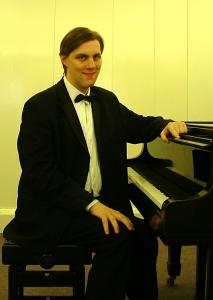
St John's Church, Friday 15th July 7.30pm
Beethoven, Brahms, and Liszt, with Ravel & Debussy certainly give the listener plenty to appreciate and the pianist plenty to go at - and indeed Jonathan did just that. There were occasional slips but they mattered little in an overall musical series of performances in which Jonathan was clearly emotionally and mentally involved. He has a prodigious memory and an amazing technique that looks effortless but has power and depth.
Beethoven's "Waldstein" Sonata began the evening, and was a commanding performance, although I could have lived with a larger range of dynamics and a little less sustaining pedal which tended to mask the music for me. The high point of the 1st half for me was the Ravel 'Valses nobles et sentimentales'. The pedalling worked well here and I felt that Jonathan was more relaxed in these pieces. Debussy finished the 1st half and again the phrasing and use of the pedal suited the music wonderfully.
Speaking to Jonathan in the interval I learned that Brahms and Liszt were among his favourites, and he didn't disappoint in the 2nd half. The 3 late Intermezzos and the G minor Rhapsody were delivered with a combination of angst and passion. Then we had the Liszt Sonata - and what a bravura performance this was. Jonathan was clearly at home with this style and made it his own. I have heard a number of pianists play this piano and few have got the depth of sound that Jonathan managed to bring out of the bass end of this instrument. It is not the greatest concert grand that I have heard or played but tonight it had a good workout!
Jonathan's informative and amusing introductions were an added bonus to a very enjoyable evening as was the encore - Mendelssohn Scherzo Capriccioso He is also quite good at moving the piano as a few of us found out after the recital!
Andrew J Hodkinson
MAGICAL OPERA MOMENTS - City of Manchester Opera
City of Manchester Opera are now regular participants in the Fringe. This year they brought their new musical Director, Juan Ortuno. Juan has a permanently broad smile and an enthusiasm for opera which he immediately communicated to a large audience in St John's church.
Last year COMO gave a concert performance of a complete operas but this year their programme consisted of some of the greatest moments in " the world's finest operas". This gave most members of the group an opportunity to sing a solo. And what wonderful voices they have!
So we had a fine duet from Carmen with John Elliot singing Don José and Rachael van Heel taking the part of the gentle Michaela.. And then a highly charged excerpt from Aida with Eric Cymbir the unfortunate Radames the wonderful Margaret Fergusan as the eponymous heroine and Carol Taylor a powerful Amneris, the other singers forming the subdued chorus outside the tomb.
COMO had saved the best part of their programme until the end. A number of arias from Tosca with John Elliot an excellent Cavaradossi, Elizabeth Ambrose as the forlorn Tosca, and George Hulbert a splendidly unpleasant Scarpia while the chorus sang the Te Deum from the end of Act 1. And finally the great moment from Turandot when Prince Calaf, Glyn Taylor, decides to try to solve the riddles in order to win the princess and Turandot's ministers, Oliver Bird, Stephen Hoyle and Chris Elliot, fail to discourage him.
A truly uplifting evening , helped considerable by Jonathan Ellis coping manfully with the slightly dodgy , St. John's piano.
Peter Low
MART'S TRAD JAZZ EVENING - TAKE TWO - Mart Rodger Manchester Jazz & Marts ManJazz4 or 5

The Railway Bridge Street, July 8th (and again on July 22nd)
Mart Rodger brought his full 7-piece line-up to the Fringe for a splendid evening of (mostly) tradjazz. Two one hour sets and 21 tunes ensured full value for money and the quality of the playing was of the highest class. If jazz is your thing be sure to be at the Railway on July 22nd when the band returns. Mart says they have a repertoire of 2000 tunes and so they'll probably play a totally different set.
It may seem rude and unnecessary to point out that these guys have been playing for many years - bass player Colin Smith was 80 earlier this year. Some might imagine that the fire had gone out of the bellies of veteran musicians but the fact is the playing was crisp, clear and focussed throughout. Clearly they love the music they play and enjoy playing together.
Tonight's tunes included pieces from many of jazz's early greats - Kid Ory, Benny Moten, Bix Beiderbecke, Mezz Mezzrow. The highlight of the first set was, for me, a take on the Louis Armstrong/Jelly Roll Morton tune Wild Man Blues. Unexpectedly the set ended with Sonny Rollins' calypso classic St Thomas.
The second set included a splendid version of King Oliver's The Riverside Blues and a touching piano solo by Roger Browne who played Joplin's waltz Bethena.
Eric Brierley sung a handful of songs - notably Dinah - and Roger Browne treated us to Just One of Those Things.
All in all a lovely evening, charmingly presented by Mart Rodger and played with exhuberance, energy and great musicianship. You'll go a long way to hear this music played better.
Tonight's line-up was: Mart Rodger - clarinet; Allan Dent - trumpet; Eric Brierley - trombone; Roger Browne - piano; Ian McGann - banjo/guitar; Colin Smith - double bass/tuba; Chris Pendlebury - drums.
Keith Savage
MUSIC AND THE MUSE: THE POET'S WAY - Selfmade Music
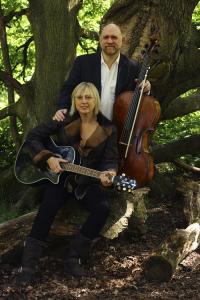
Selfmade music are a most versatile and musically accomplished duo. Susie Self is a wonderful and exspressive singer with a voice that can fill the space with no obvious effort at all. She is also an accomplished guitarist, pianist and composer. Michael Christie is a 'cellist of some considerable skill and musicality, making his old German 'cello sound rich and mellow. Michael is also an able pianist, and enthusiastic speaker, and also composer.
These two artistes combine their considerable skills to great effect to give a lecture recital around the English poet and playwright, John Drinkwater and his travels. Not only do we get poetry and music but some amazing photos from the writer's own collection.
The session started with a song composed by Susie to words by her grandfather John Drinkwater, but sadly with no programme I was unable to catch it's title. Like three other songs of hers in the programme the music was delightful, and the performance pretty much excellent. I know of few opera singers who can accompany themselves on the piano, and even fewer who can do it as well as this.
Interspersed with informative chat about John Drinkwater's travels we were treated to performances of Elgar, a setting of Rupert Brooke by John Ireland, a Meditation by Hindemith, a Schubert song, and a host of other songs, even 5 Haiku by Robert Frost and music by Susie Self in which her use of the 'cello was both inspired and atmospheric. All was delivered with style, panache, musicality, and great affection. This was a thoroughly enjoyable occasion and though bordering on the self-indulgent at moments it was none the worse for that.
If you haven't been to hear them (and I know you haven't because I was an audience of 1), then you have missed a treat. Catch them later this week - you won't regret it.
Andrew J Hodkinson
MUSIC FOR A WHILE - Angela Rowley & James Pelham
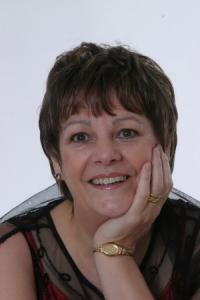
URC Church, Sat 9th July at 2.30
'Music for a while', according to the lovely song by Purcell, 'doth all your cares beguile.' There's a paradox here, in that many of the songs that beguile us enough to forget our own troubles, are about the cares of others. This was the theme of the recital by soprano Angela Rowley and her accompanist James Pelham, given at the United Reform Church.
The venue boasts a fine Broadwood grand piano, very different to what is normally found in small churches, but also very different to the Steinways found in many concert halls. It's an instrument of great character and tonal range, especially in the hands of such an expert and sensitive accompanist as James Pelham. He works extensively with Angela Rowley, accompanying her, her pupils, and a choir she directs. This relationship was very evident throughout the recital. A good accompanist puts both the performer and the audience at their ease: this was certainly the case on Saturday afternoon. James also contributed two solo items, both by Grieg. These were beautifully played and fitted perfectly into the programme.
Devising a solo recital is no easy task, and this was a perfect example of how to do it. Starting with Purcell and ending with Peter Warlock, it followed more or less chronological order, with English songs beginning and ending the programme. In between them came a group of German songs and a group of French ones. Thoughtfully, translations were printed in the programme, but Angela also gave carefully researched, helpful and often entertaining introductions throughout.
Angela has a fine voice and many years of experience at communicating with audiences. The great German soprano Elizabeth Schwarzkopf once surprised a questioner by stating that the eyes are a singer's most important attribute. One only has to watch Angela sing to realise the truth of this. Seldom glancing at her music, she demanded and engaged the audience's attention. Meanwhile, her hand gestures - something all classical singers agonise over - were ideal: restrained and unobtrusive. As a modern languages graduate and former teacher, Angela's French and German were exemplary, as was her English diction.
Here were songs that will have been familiar to many in the audience: masterpieces by Schubert, Brahms, Richard Strauss... Not everyone is as familiar with Mozarts lieder and the influence they had on Schubert, but here was a beautiful example, Abendempfindung. I think Angela's only slip in the whole recital was to tell us it was written in 1887 rather than 1787! The French group - Massenet, Debussy, Fauré and Venezuelan born Reynaldo Hahn, made a perfect contrast. It was lovely to hear 20th century English songs: while Vaughan Williams, Britten, Quilter and Warlock are familiar to many concert goers, Thomas Dunhill and Michael Head are less so. Angela communicated her love of their work in convincing and moving performances.
Angela hoped we'd enjoyed the recital and hoped we'd return next year: I'm sure everyone there will be eager to. As if the feast of music wasn't enough, a feast of strawberries and cream, homemade biscuits, and elderflower cordial followed. Though it was noticeable that, given a choice of another song or diving straight into the strawberries, everyone stayed put for the sparkling encore!
Donald Judge, July 10th 2011
MUSIC FOR STRINGS - Amaretti Chamber Orchestra
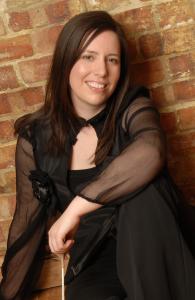
It was great to welcome back the Amaretti to the Fringe under their new conductor Sinead Hayes. They began their concert with Wagner's Siegfried Idyll intriguingly arranged for strings. In fact the arrangement worked rather well with Siegfried's dashing horn call given to the violas and the strings cleverly evoking the Christmas morning when the piece was first performed as a birthday present for Wagner's wife.
And then a magical performance of Bach's double concerto with superb soloists Dewi Tudor Jones and Rosy Williams. Sinead had decided that no conductor was necessary for this work - and she was right. The ensemble was utterly disciplined and responsive to the soloists. It is many years since your reviewer has heard such a completely musically convincing performance of this work
After a short, enjoyable and typically twentieth century English Suite for Timothy written by his mother, Pamela Harrison, as a first birthday present and introduced by Timothy himself the orchestra gave an outstandingly fine performance of Elgar's Introduction and Allegro for Strings. The two Bach soloists joined the solo quartet with Kay Thomas, viola , and Mary Dainton, 'cello and together fulfilled the prodigious virtuoso technicalities that this composition calls for. This has to be one of the best concerts given by the Amaretti in Buxton and certainly a memorable highlight of this year's Fringe.
Peter Low
MUSIC TO HEAR - Sheffield Chorale
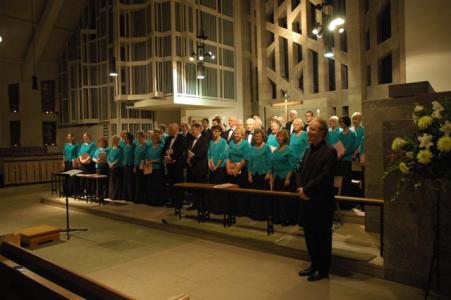
A highly experienced and competent choir with a programme of songs that choirs like to sing under the talented conductor Neil Taylor, who also happens to be organist and director of music at Sheffield Cathedral. There is no doubting the quality of this ensemble. Their thoughtful, unaccompanied performance of Pearsall's Lay a Garland absolutely confirmed this.
But what really made this recital so special was the choir's evident enjoyment in making music and their overt assurance in their ability , not just to sing the pieces but to interpret them in a meaningful way. I addition programming for this sort of concert requires considerable care to avoid a succession of similar works. The Sheffield Chorale's programme was full of contrast and maintained the audience's interest completely. While the choir had a break the conductor's daughter, Ella, the BBC Chorister of the year no less, revealed a powerful voice in some solos of which Wolf's Verborgenheit was memorable.
A perfect concert for a summer afternoon, this is the first visit of this group to the Fringe. Let us hope it is the first of many.
Peter Low
ORCHESTRA CONCERT - High Peak Orchestra
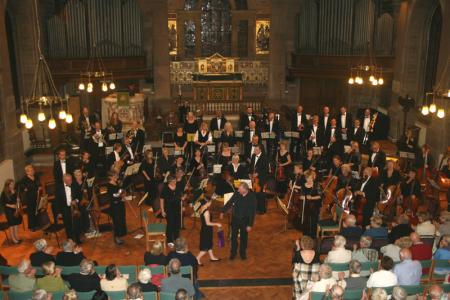
HPO's concerts are always exciting and this was no exception. Opening with a thrilling performance of Borodin's Polovestian Dances the orchestra showed us what an astounding effect this music must have had in the context of Russian nationalism. Urged on by some spirited work from the timpanist the result was quite breathtaking.
Walton's Viola concerto was the main work in the programme using the 1961 revision by the composer of the orchestration. This requires exceptionally large forces and, consequently, intense skill from the conductor to keep control. The Viola concerto is thought to be one of then more difficult works in the repertoire and it says much about Andrew Hodkinson's ability to inspire his players that the HPO can tackle such a demanding composition with such assurance. HPO were fortunate as well in having the talented Katrina Brown as soloist. She looked impossibly young to take on this challenge but there was no doubting her amazingly confident interpretation which was greeted with acclamation by the large audience.
The concert ended with the Symphony No 1 by Sibelius. Andrew admitted in the programme notes that he is much attracted to the symphonic work of Sibelius. This attraction was evident in the orchestra's stirring performance with some particularly sensitive playing from the woodwinds and the harp.
Peter Low
PIECES FOR EIGHT - Sovereign Saxophone Octet
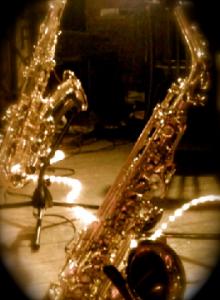
Well I have been entertained and converted this evening! As a fairly straight classical musician who has never been very convinced by the Saxophone, I was captivated by this performance by eight happy, accomplished, and enthusiastic saxophone players.
The ensemble launched into their first two pieces without any preamble, and we later found out that they were by Gabrieli. I had guessed at that (as I should) and was amazed how music conceived for choirs and brass translated so well to the sound of a saxophone group. The use of the antiphonal effect was put to good use in the impressive acoustics of Buxton Methodist Church. The dynamic range was good, and the intonation mostly secure, with confident tempo changes.
Then we were treated to some close harmony and effective 'jazz' rhythms in two arrangements: Swingmatism, and Sidewalk Blues. Two movements from Gustav Holst's "St Paul's Suite" were next in line for the Saxophone treatment. For my taste (as a string player) these worked less well, but were well performed.
There followed a wonderful piece called "The Zonk Zone" which was reminiscent of Gershwin "Walking the Dog", and this was paired with a lively piece featuring the Tenor Sax in a Jazz break - "Carnival" by Karen Street.
We had "Puttin' on the Ritz", and "Moon River", and "Sidewalk Blues" with "Pearls". But the high point for me was a piece called "Witch Hunt" which made me think - John Adams meets The Simpsons! Brilliant and very exiting rhythmically. They closed with a rather quirky arrangement of the "Sheik of Araby" complete with the soound of the muezzin, camels and of course sand!
14 very varied pieces played in an hour by such keen exponents of the Sax was a real treat. OK, there were small moments of slight imperfections in rhythm and intonation, but the 'music' never wavered, and the obvious enjoyment of the performers communicated itself to the audience almost tangibly.
Andrew J Hodkinson
POP SONGS & PIE CHARTS - Project Adorno
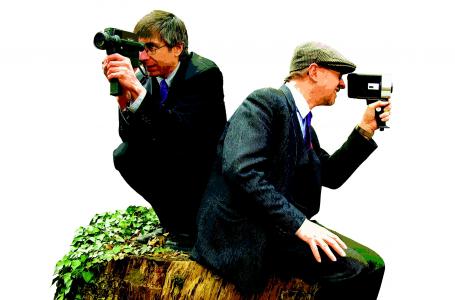
Underground Venue - Barrel Room
The most disappointing part of this performance was the sad lack of an audience, only three others enjoyed an hour of giggles and tapping feet to the geeky words and beats of this talented duo. Gloriously entitled Project Adorno, sharp-suited Praveen Manghani and Russell Thompson treated us to the lovechild of The Human League and Radio Four's Shipping Forecast.
They helped us to understand how popular culture is something to be celebrated, embraced, ridiculed and rejected in equal measure with their own rock operas, ballads and electro-pop synth riffs, with the occasional acoustic guitar, Rolf Harris Stylophone, video screening, Powerpoint presentation and much-loved pie charts.
Cleverly woven lyrics answered difficult questions like:
do Formula One drivers use SATNAV?; and
what is the best way to fold a map?; and
is there a Lonely Planet book on planets; and
exactly where was Marillion's first gig?
Fondly remembered memories are brought clearly to life with throbbing back-beats and risky rhyming (just how do words like appealing and cup of Darjeeling find their way into the verse of a song?).
Constantly developing their performance, they look forward to a time when the iPhone rules the world and look back to The Eighties when "the 1990s stretched out like a long line of hills that I'm reluctant to climb." Love songs and rock'n'roll numbers collide in perfectly constructed symmetry with Professor Stephen Hawking guesting on lead vocals and a Rubik's Cube on drums.
It is clever poppy stuff and nothing is immune from comment: ranging from the demise of library stamping instruments to politics to Syntax Error messages to aging all the way to death itself (and the bit between the last two when you might want to join the National Trust!).
If you want to enjoy a show that encompasses the true spirit of the Fringe, then pop along. Remember not to eat too many of them pies though!
David Carlisle
POPULAR FILM AND LIGHT CLASSICAL MUSIC CONCERT - Fordante
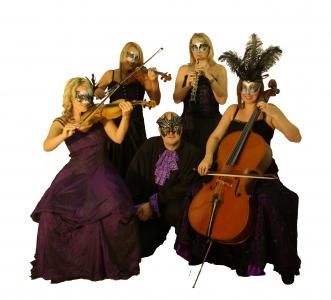
There has recently been a considerable revival of interest in light music, largely headed by the BBC, so Fordante's arrival on the Fringe with their programme of light music is almost perfect timing. This is a quintet of highly talented musicians whose playing is completely confident and secure and whose rich tones were totally appropriate for their programme.
What made Fordante's concert of special interest was that most of the works they played were composed by their keyboard player Phil Mountford. His music is very approachable and stands comparison with very well known pieces of film music such as Pirates of the Caribbean and Love Actually. His compositions in the programme were characterised by giving most of the solo work to his string or wind players leaving him on the keyboard with the more modest task of accompaniment. And what fine soloists they were! Almost every piece had us gasping with admiration at their musicianship. Particularly memorable was Shulah Oliver's solo violin in Schindler's List and Rebecca Dawkins oboe solo in Gabriel's Oboe.
A delightful concert for a summer afternoon..
Peter Low
ROSIE & THE RAGDOLLS - Rosina Al-Shaater
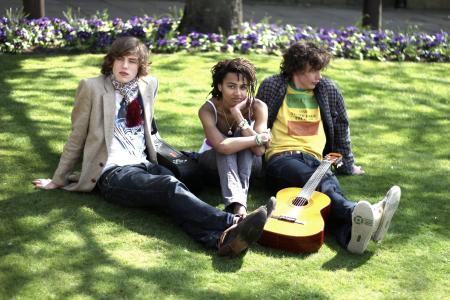
Barrel Room - downstairs in the Old Hall Hotel
Again on July 19th at 7pm and 23rd at 7:30pm
I had a great start to the evening of the first Friday of the Fringe; sitting with a half pint of something in the Barrel Room at the Old Hall Hotel; a performance of a varied blend of songs; Hillbilly, Reggae, Ballad, Traditional folk and, more enjoyably for me, Jazz. 'Oh Sister!'
Rosie and the Ragdolls were without drums this evening, leaving them with a guitar, a modified, 3 string banjo (not a Ukelele) and the exquisite voice of Rosina Al-Shaater.
Do not come expecting a tightly rehearsed, accomplished band of musicians but expect to be 'chilled out' by a relaxed and intimate selection of songs which will involve you from the feet up.
When they said their goodbyes, the audience asked for more and we listened to an encore 'Its wicked not to care' and 'La Vie en Rose' in French and unaccompanied.
Refreshing and unpretentious. A really cool way to chuck out the angst of the day!
Martin Wood
SAD SONGS AND STORYTELLING - Rebecca De Winter
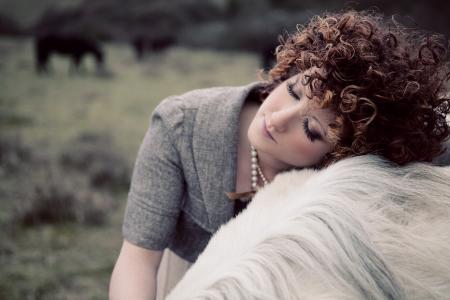
The evening's event was based on Daphne Du Maurier's famous novel, Rebecca. The main singer and storyteller was interestingly called Rebecca De Winter, after the infamous character from the book. Throughout the evening Rebecca's convincing reading of passages from the novel alternated with songs the group performed. The songs were written by David Litchfield and Rebecca De Winter except the song called Joy which was entirely written by Rebecca. The audience of twelve were in close proximity to the four performers giving an intimate feeling to it and the setting of Scriveners bookshop created an atmosphere suitable for listening to a strange and chilling tale.
Rebecca sang and played the keyboard whilst her co writer David played chords on the guitar and for some of the time joined in with the singing. There was also a violinist and a drummer.
Rebecca's voice was impressive creating an appropriate eerie feeling as was the individual line the violinist played, the part singing which took place in some of the songs and the soft and gentle percussion playing added to the atmosphere. The songs were well written creating suitable moods for the novel.
All the songs are on a CD which has recently been released and was sold at the bookshop. It also can be downloaded from iTunes. It is certainly worth buying.
Roger Horvath
SALMAGUNDI AT THE RAILWAY - Salmagundi
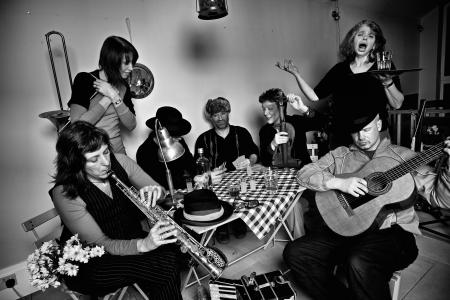
The Railway, 9 July 8pm to 11pm
This exciting seven-piece band from Nottingham defies all categorisation creating tightly performed new music inspired by a wide range of world influences from Hungarian folk dancing to ska, samba, Afrobeat and tango.
Oddly enough, these disparate inspirations do come together to create a distinctive style that is powerful, zesty and immensely danceable. The closest comparison I can come up with is the French band Les Negresses Vertes, but really the band has its own unique sound and, incidentally, look. Keeping to a black and red theme, the players nevertheless express their own individuality with one choosing black fishnets over red leggings, one wearing a skirt of red roses and another looking cool in pinstripes and fedora.
The all-female frontline change instruments with ease playing saxes, clarinets, accordion and trombone as well as introducing unpretentious, earthy vocals for some of the numbers. The backline meanwhile marries it all together with drums, guitar and funky double bass.
Down at the Railway, I was initially surprised not to see more dance floor available. The 60-strong audience seemed at first to be faintly awestruck as they sat at the tables provided. However it didn't take long for the dancing to kick off at the front and by the band's second act there was quite a crowd up there with the eclectic music offering an excuse for some pretty individual moves.
In the interval I had a word with the wonderfully named Stella Patella from the band and she explained that three of the frontline had originated from a 1980s' women's peace movement band called The Fabulous Dirt Sisters. There is certainly a sense that these experienced performers have been around a bit and their lyrics hint at themes of female solidarity and music as salvation. 'However you close yourself down, your heart makes a sound... There's always a rhythm...'
Later, I looked up the word 'salmagundi' - a salad dish, apparently originating in early 17th century England and comprising seafood, vegetables, fruit, leaves, nuts and flowers dressed in oil, vinegar and spices. In other words about as novel and enticing as this band. If you missed them at The Railway or busking at The Slopes on Saturday afternoon, why not have a listen to their new album The Full Falafel. For details, see http://www.salmagundilive.co.uk/
Stephanie Billen
SAM DUNKLEY - Performing Arts Etc
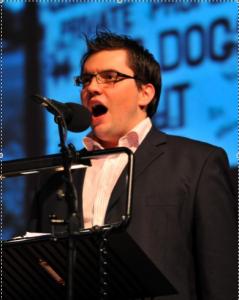
17, 23 July, Barrel Room
Sam Dunkley engaged well with his audience and sang many songs with easy or well-known choruses. He has a clear speaking voice and sang, "I am a Rover" unaccompanied most tunefully. Personally, I preferred his piano accompaniments to his guitar playing but the variation between these two instruments adds to the variety of styles of songs he could sing. He did an excellent version of the "The Galway Shawl". Another song he sang well was Ralph McTell's song "Girl from the Hiring Fair". His performance contained an entertaining mixture of his own compositions as well as popular and less frequently sung songs from other songwriters.
Carolyn Page
SINGING FROM THE HEART - Ordsall Acapella Singers
Saturday 16 July 11
The Ordsall A Capella choir under their director Jeff Borradaile evidently really love what they are doing. As they also do it very well their audience is happy to respond. This turned out to be as well, since we got to do audience participation as well - which is taking a chance with a group of unknown adults.
The choir, from Ordsall in Salford, is community based both in membership and for most of their many performances. They are unauditioned and of all ages and backgrounds, singing A Capella (unaccompanied) and for almost all of their mixed programme without copies. Without scores to watch they watch their conductor, sing out, and respond flexibly and cheerfully, and their diction is exemplary.
Their director is a professional music teacher, bursting with enthusiasm, rhythm, evident skill - and perfect pitch, which certainly helps: no tuning forks or instrumental assistance for him. He also arranges much of their music himself, so that even familiar pieces come with a new flavour, and sings bass when he is needed, or can't resist taking part.
The programme was very varied: popular songs (Buddy Holly's 'Little things'; ' Imagine'; 'How much is that doggie in the window?'), spirituals ('Joshua fit the battle of Jericho'; 'Down by the riverside'; 'Swing low), Noel Coward's 'Let's do it', several stirring songs from South Africa, and plenty more. The audience participation had us all singing not only in three parts with three different (co-ordinated) songs, but with actions as well; who said the English are reluctant to take risks?
The Ordsall A Capella Singers first came to the Buxton Fringe in 2010, and enjoyed it so much they lined themselves up immediately for 2011. They tell us they'll be back in 2012, and I hope to be there. In the meantime, they'll be at the Palace Hotel at 7pn on Sunday 17 July, so why not join them there?
Ursula Birkett
SONGS OF ROMANCE - Timothy Kennedy & Catherine Hall-Smith
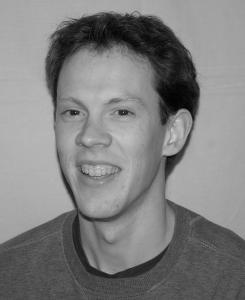
How wonderful!. Genuine Lieder on the Fringe. Tim Kennedy, tenor joined by the incomparable Catherine Hall-Smith gave us a carefully thought out performance of Schumann's Opus 39 Liederkreis.
Schumann was entranced by Eichendorf's poetic ideas that man should find happiness by absorbing the changing moods of nature. This duo caught the powerful intensity of those emotions in a fine rendering of this beautiful work that had the audience spellbound. Tim has a very pleasant voice which can adapt to the varied demands that Schumann makes. And Catherine, a superb accompanist, was an ideal partner. The result was pure enjoyment.
The programme concluded with three charming songs by Fauré giving a French view of romance and finally in a decidedly no-nonsense English idiom with three songs by Quilter.
A very pleasant lunchtime recital from a highly talented duo. It would be nice to see more of them on the Fringe in future.
Peter Low
SUMMER CONCERT - Manchester Recorder Orchestra
Buxton Community Church, 16 July, 7.30-9.30pm
Regular visitors to the Buxton Fringe, The Manchester Recorder Orchestra began its programme with the rousing Manchester Welcome by Colin Touchin, a work that actually seemed to say 'Manchest-oh' in a Mancunian accent in its music.
I'm ashamed to say I have never heard the orchestra before, nor in fact any recorder orchestra, so the first ten minutes of the concert were quite something as my ears adjusted to the different sounds created by a group made up of every imaginable recorder, from the tiny sopranino played by orchestra leader Martin Bisknell to the massive contrabass, an instrument that looked more like a piece of plumbing than what many of us would think of as a recorder. Something about the way these instruments called and answered each other put me in mind of being in a forest at dusk, with shrill songbirds counterpointed by deeply resonant wood pigeons.
Touchin is a contemporary composer and the first half of the programme was made up of modern pieces written for recorders. Ian Farquar's gently melodic Hereford Suite was followed by Colin Hand's Improvisations on a Souling Song, a work that Hand has apparently thought better of but which certainly pleased this audience with its urgent sense of progression and in Vario 3, a rather oom pah pah section that put me in mind of barrel organs and fairgrounds. I wasn't being as fanciful as all that apparently; in the interval, conductor Ian Chesters was telling me how acoustically speaking, the recorder is very like an organ pipe.
In the second half (following a free juice bar complete with olives and cheesy straws), there was a distinct change of tone as a different conductor, David Walsh, guided the orchestra through arrangements of orchestral works by Rimsky-Korsakov, Elgar and Haydn (no Grieg, contrary to the Fringe programme but I don't think anyone was too worried). For me, this second half was the most satisfactory with the recorders giving fresh life to familiar works and really soaring in the performance of Haydn's Symphony No 96 in D, dubbed the 'Miracle' so because the audience at its premiere escaped unharmed after a chandelier fell spectacularly to the floor.
The setting of the Community Church in London Road, a change from their traditional venue of Trinity Church, proved congenial if acoustically unforgiving to the slightest hint of un-togetherness, something the accomplished forty plus musicians mainly managed to avoid. All in all this enjoyable evening proved a refreshing demonstration of the power of a 'Cinderella instrument' too often relegated to primary school classrooms. The audience, which coincidentally was about as large as the orchestra, certainly reacted with warmth and admiration.
Stephanie Billen
SUMMER SERENADE - Ladybrook Singers with Ailsa Hoyle and Miriam Brown
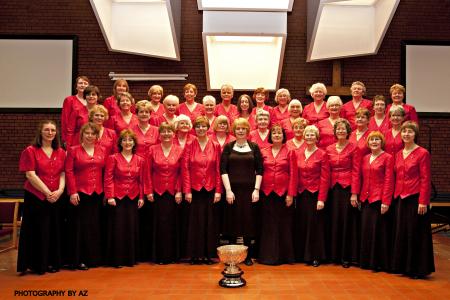
Now and again one comes across a choir with a singer as Musical Director - and it shows! And how it shows with Ladybrook Singers. They have intonation sewn up, a dynamic range that delights, diction that projects the words, and a range of facial expressions that communicates every song, and lifts the voice. Alison Bletcher excelled last night with a choir that should be justly proud of itself.
Frank's 'Parnis Angelicus' set the tone for evening, and Rutter "All things bright and beautiful" continued in musical vein. "Be still my soul" set to Sibelius' famous Finlandia melody was a little too slow for my liking, but it worked.
There followed the first guest artiste - Ailsa Hoyle playing the 1st movement of Mozart's G major Violin Concerto - and in spite of slight nerves this was an accomplished performance.
The choir returned with "Cantique de Jean Racine" by Faure. This evocative and poignant melody worked well because the singers did not push the tone, and just let it drift over the audience - quite lovely.
Then came Miriam Brown playing the first movement of Brahms 'Cello Sonata in E minor. It is said that you can't put an old head on young shoulders but now and again you come across a player who in spite of being only 16 plays with the interpretation of a much more experienced performer. When Brahms writes in E minor he has something special to say - and Miriam said it all.
The first half finished with the Singers giving us more Rutter, "For the beauty of the earth" which is one of his super melodies, and Britten's "Deo Gracias" - a wonderful choral war-horse but seldom sung with such control and meaning.
The second half began with the Singers giving us three folk song settings, the high point of which was "Danny Boy" arranged by Alison Bletcher. There are so many arrangements of this song but I have seldom heard a more simple arrangement that succeeded in bucket-loads. This has to be the the best tune in all music.
Miriam returned and beautifully captured the 'joke' in Frank Bridge's "Scherzo", and Ailsa gave us the moody, slightly spooky "Legend" by Wieniawski - a truly special piece.
Alison excelled again in an arrangement of "Fields of Gold" by Sting, and then came the magical moment of "Somewhere" from West Side Story by Bernstein - I nearly cried! "America" followed and was very spirited and swift, and it worked!
Then a magical trio of Violin, Recorder, and 'Cello gave us Hook's Trio No 2, followed by Gymnopodie by Satie with the addition of the piano ably played by Celia Maylor who had worked her musical socks off all evening.
The Singers rounded the evening off with "Softly as I leave you" - and they did just that. Thank you to everyone involved for a thoroughly wonderful concert.
Andrew J Hodkinson
THE MUSICAL TRAVELLING SHOW OF PIERRE A LA PERDRIX - Sam Partridge & Peter Calder
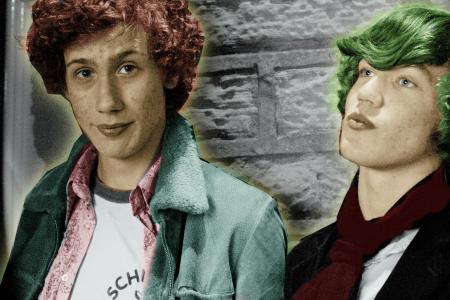
Youthful troubadours, Sam Partridge & Peter Calder, are an affable pair of singer-songwriters and undeniably talented. Accompanying each other on guitar and a reclaimed, three-string American banjo (learned to a great deal of skill in just three months), they play a collection of standards, Appalachian-themed folk and self-penned material (some in a halting Franglais).
While they do have talent, they could do with working on their presentation skills. There's something disarming about a slightly rambling performance (indeed many a folk singer has made a career out of it), but this show crossed the line into something altogether more ramshackle. It is this area that needs to improve, if they are to lift their game from talented young buskers, to an act that an audience can feel justified in spending an hour with. The title and brochure blurb of the show hint at a structure and narrative to the show that at present isn't there - perhaps that's a good starting point.
Robbie Carnegie
THE RIVER STORY - Emlyn Vaughan
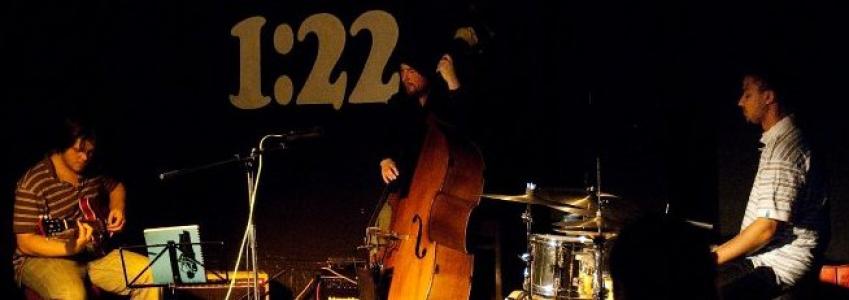
Barrel Room 21st July
We get little jazz on the Fringe - it has always been regarded as a minority taste and, to be fair, jazzers don't always help their cause with indifference towards the audience.
Happily the Barrel Room was pretty much full to hear this year's 'modern' jazz offering from the ever-amiable Emlyn Vaughan and his trio. Emlyn returns to Buxton most years - memorably in 2009 with Gilad Atzmon - and tonight his partners were Graham Garside (left-handed guitar) and Matt Davies (drums) who deputised for Eddie Hick.
The programme included numbers from the post-war jazz canon - Coltrane's Giant Steps, Monk's Pannonica, Charlie Parker's Big Foot. Some more recent tunes to get an outing included Keith Jarrett's Margot, Eddie Harris' Freedom Jazz Dance and Mark Turner's Lennie's Groove.
The highlight of the evening for me was a take on Duke Ellington's African Flower, which incorporated loops of sound from Graham Garside and some of the rockier guitar playing of the night (reminiscent at times of Norwegian Terje Rypdal's playing). The trio produced big splashes of sound here.
The trio format allows for solo opportunities and duo combinations and each player had time and space to be heard. Matt Davies has light hands and is a sensitive drummer, delivering complex patters without overpowering; Emlyn's fat bass sound was almost too big for the cramped space of the Barrel Room and the electric bass, which only came out for the finale - Freedom Jazz Dance - worked better. Graham Garside is a fluent and melodic guitarist.
This was highly accomplished and listenable jazz - no ugly noises to scare anyone away. The audience - wide-ranging in age and a good mix of men and women (not always the case for jazz) - was highly appreciative. More please.
Keith Savage
THREE'S A CROWD - The Ryebank Trio
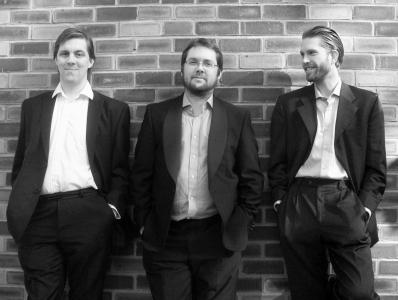
This group consists of three musicians, Jonathan Ellis, piano, Duncan Reid, violin, and Douglas Badger, 'cello, who met while studying at the Royal Northern College and formed their trio in 2002. They have now been playing together for sufficiently long that their ensemble is just about perfect. They know each others strengths and their musical balance is superbly judged.
Their programme opened with the Schubert piano trio, Opus 99. Although this is quite a familiar work we were quickly absorbed in the delights of the composition, particularly the Andante with one of Schubert's loveliest melodies. Their control of dynamic variation especially in the Rondo was exceptional It was without doubt a great performance.
Following the well known Spanish Dance of De Falla arranged by Kreisler with Duncan as soloist, Douglas Badger gave us a beautifully controlled 'cello solo, Louange à l'éternité de Jesus from a larger work by Messaien with Jonathan's careful accompaniment.
The concert concluded with Brahms piano trio No 1 opus 8 using the well known revised version that is normally performed. This is technically a very demanding piece but these young musicians were completely in control and played with supreme assurance and confidence. The turbulent climax of the highly chromatic last movement will remain as one of the more memorable moments of this year's Fringe.
Peter Low
TIDESWELL AND CHAPEL MALE VOICE CHOIRS IN CONCERT - Tideswell Male Voice Choir
A capacity audience greeted the 2 choirs last night at St John's Church. It proved to be a varied and entertaining programme with some first-class singing. Unfortunately there was no programme and this is something of an omission I always feel, especially if the announcement of items and names of people are not totally clear to the listener. Really a microphone would have made this less of a problem. But to the music!
The first item was a combined one and "Alexander's Rag Time Band" was a great opener. Andrew Cummings excellent accompaniment was just a little too discrete for this. Then it was over to Tideswell to start the ball rolling, and the spread-out small group that sang the opening of "When you walk through a storm", was a nice touch especially when the rest of the choir filtered in as the song progressed. Here the piano playing of Christopher Ellis was a little too loud for good balance. "There is nothing like a Dame" followed and this was a fun, clever performance. The singing of the next two numbers was 'tight', and well controlled with good dynamic range and clear diction.
Then we were treated to a solo from Nicholas Bennett (Baritone), with accompaniment from Christopher Ellis (again a little too loud). A great voice, but sadly the lower register didn't quite carry in this building.
Then it was the turn of Chapel Male Voice Choir, who gave us a fine performance of "Some Enchanted Evening", Ralph Vaughan Williams "Linden Lee", and a Welsh Folk-song arrangement. Some really excellent singing here and a great finish took us into the combined choir's rendition of that war-horse "Gwahoddiad" which had power and involvement.
After the interval Christopher Ellis treated us to the 3 Gershwin Preludes which were delivered with panache and enjoyment. Chapel treated us to a clutch of songs including the "Cantique de Jean Racine" by Faure, always a difficult song to bring off, and the musical line didn't always work, but it was a fine performance with great dynamics and tone.
Tideswell then followed with 3 more songs including "Do you hear the people sing?" from Les Mis, which the audience enjoyed greatly. We had a Baritone solo singing "Stars" which sounded good in this acoustic. Then it was time for the final combined item "Morte Criste", and this was a fine finish (once Andrew Cummings had 'wound up the organ'!) A thoroughly enjoyable evening. I bet the "after-glo" was fun!
Andrew J Hodkinson
WOMEN IN LOVE: AN EVENING OF SONG AND OPERA - Laura Monaghan & Mark Cartwright
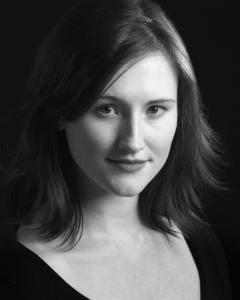
Taking the broad theme of Women in Love, soprano Laura Monaghan and her accompanist Mark Cartwright assembled a varied programme that bore many delights.
The first half was devoted to art songs and lieder, the centrepiece of which was Schumann's Frauenliebe und -leben, a song cycle charting a relationship from the first impetuous stirrings of love, through the joy of marriage and childbirth, to betrayal and despair. Laura's lightness of touch and expressive delivery conveyed brilliantly the changing moods of each movement, and her crystal clear diction reminded what a beautiful sung language German can be.
Very wisely the operatic big guns were saved for the second half of the programme, with arias from The Marriage of Figaro (I was particularly taken by her rendition of Cherubino's aria - not a woman obviously, but sung by one, so we'll allow it!), Carmen and La Boheme amongst others. There is no doubt that for a proportion of the audience, these were what they had come for as Laura's voice soared to some fantastic 'money notes' - the (and I say this in deference to the people behind me discussing Pop Star to Opera Star) 'chaka chaka' moments.
Again, then, the well-balanced programme changed tack with Jerome Kern and George Gershwin making an appearance, before a return to art songs, and a final, haunting encore of Britten's setting of O Waly, Waly.
Laura Monaghan is a singer a immense talent, with a colourful, warm and nuanced voice that lends it self to all these musical styles, as she skips through her repertoire with great dexterity. But its not just about her - the programme also showcased the considerable talents of pianist Mark Cartwright, particularly in the Schumann and on two fiendishly difficult pieces, Quilter's Love's Philosophy and Wolf's Ich hab in Penna.
The great talents of both performers notwithstanding, to me what can often make or break a concert is the interrelation between the artists and the audience, and Laura and Mark both built up a warm rapport with those present in St John's Church, providing witty, informal and informative introductions to each piece.
At one point, Mark describes Susanna in The Marriage of Figaro as 'a young woman at the top of her game', and this description could apply to Laura Monaghan as well, were it not for the fact that, given the beauty of her voice and the breadth of her ability, I'm sure the best is yet to come.
Robbie Carnegie